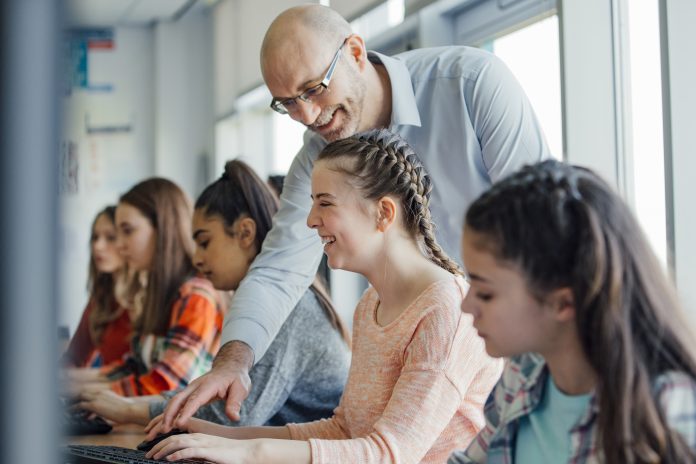Teacher workloads have dominated headlines since the start of the year, as widespread strikes have taken over the UK’s education system – could ChatGPT help?
The latest Tes Schools Wellbeing Report found that a staggering 68% of the 5,858 teachers it surveyed thought current workload levels are unmanageable. Meanwhile, in February, even education secretary Gillian Keegan admitted in a letter to schools across the nation that she knew that the teacher workload was too high.
The knock-on effects of this are vast. The overall well-being and mental health of our teachers is impacted; a recent report found that three-quarters of all school staff are stressed. And, teachers are ultimately leaving the profession as a result; 44% of teachers in England are planning to quit by 2027.
As part of the negotiations between the government and teaching unions to end the strikes, tackling the workload has been a constant sticking point – alongside pay and overall funding. Teachers are hyper-aware of the fact that a simple pay rise won’t resolve the issues of their workload and the subsequent impact it’s having on their students’ education – teachers’ number one priority.
It is clear that changes to the curriculum, and the volume of paperwork teachers are required to undertake needs to be reviewed and improved. And, there have been important developments in the accessibility and value of Artificial Intelligence (AI) technologies that mean they can be better utilised within education settings to help free up teacher time, supporting admin heavy tasks and allowing teachers to use the time they do have on the most important elements of their role.
Can ChatGPT work in the education system?
Much has been said about the impact of ChatGPT and other generative AI on education – a lot of it from a negative perspective. Many believe it will be used by students to cheat, and it could cause the end of homework. Some schools have even blocked ChatGPT from their entire ICT systems.
Like with any new technology, regulation and a greater understanding of how it can be used in a positive way is always necessary. Concerns have been raised in the past about the use of smartwatches by students to cheat. Similarly, when phones became more advanced, and their easy access to the internet became commonplace, many were worried about how the education system could monitor and moderate the use of phones in the classroom. Fast forward ten years, however, and phones and tablets are being used as positive learning tools within the classroom.
It’s important that we think carefully about how we define ideas like ‘cheating’ in schools and develop students’ digital and information literacy to ensure that they know how, when, and why to interact with emerging technologies, including AI. Technology is evolving rapidly, and the specific evolution of services like ChatGPT and machine learning AI tools could have a drastically positive effect on how modern educators do their day-to-day work if used appropriately.
For instance, the marking required of teachers has been an ongoing discussion point in the battle for a better work-life balance. An Ofsted survey in 2019 found that 11% of teachers’ time is spent on marking – with just 43% of time spent on actual teaching. Marking is an important requirement of the teaching profession, but it’s a prime example of an area where technology – specifically generative AI – can support it.
More time can be spent on individual feedback
Utilising generative AI, such as ChatGPT, to scan pupils’ work for simple errors such as spelling and grammar mistakes means teachers can spend more time assessing the overall quality of the work and providing more personalised feedback.
Similarly, AI can also be used to help teachers with lesson plans. For instance, teachers who may want to teach pupils about a breaking news story that impacts their subject can ask a generative AI tool to quickly distil the story in an easy-to-understand way for certain age groups. Then, it can even generate a quiz on that news story for teachers to test their pupils on at the end of the class.
Teachers can also get to know AI tools as allies and thought partners – it can be used conversationally to develop classroom prompts (example prompt: what are 10 unique writing prompts about ‘Lord of the Flies’?) or develop ideas with a teacher (example prompt: give me five ideas for interactive biology lesson about photosynthesis’). It can help plan meals (‘I have milk, eggs, onion, and potatoes, what should I make for dinner?’) and support other elements of home life, and at a deeper, more involved level, analyze student data to help teachers and administrators understand pupil performance, attendance, etc.
Teaching is already being made easier with technology
The reality is good technology, used correctly, has been making teachers’ lives that little bit easier for years.
Technology’s role has been cemented in the classroom for more than 20 years. From the very first use of computers to the continuous development of interactive displays and software to help teachers create and deliver engaging lessons, technology is an important tool in a teacher’s arsenal. Our Lumio software, for example, provides educators with interactive lessons, game-based activities and formative assessments at their fingertips whenever they need them.
While the launch of ChatGPT and other generative AI tools have spooked some in the education sector, it does have the potential to support teachers and their heavy workloads when used correctly. As with any new technology or innovation, there will of course, be some initial hurdles that the education sector will need to overcome and an agreement on how the technology can – and should – be used. However, we have made decisions like these before with other technologies, and education is all the better for it. Let’s make friends with AI to support teachers and students today and tomorrow.
Katie Novak, Education Strategist at SMART Technologies











